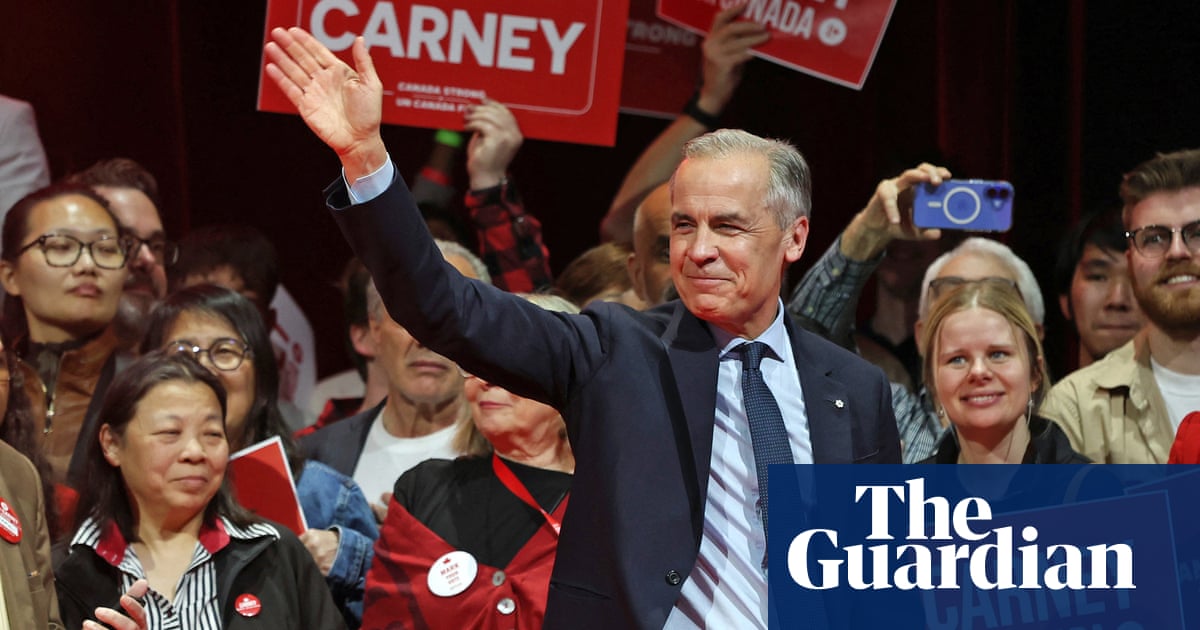Good morning.
Mark Carney used his election victory speech to claim Donald Trump wanted to “break us” as he led Canada’s Liberal party to a fourth term in office, in a race that was upended by threats and aggression from the US president.
The Liberal triumph capped a miraculous political resurrection and marked a landmark victory for Carney, the former central banker and political novice who only recently succeeded Justin Trudeau as prime minister.
Mirroring a theme of the campaign, Carney told supporters on election night that Trump wanted to “break us, so that America can own us”, adding: “That will never, ever happen.”
He also gave a stark assessment of a world order once defined by an integrated global trading system with the US at the centre, saying such a system was over, and he pledged to reshape Canada’s relationships with other nations.
“We are over the shock over American betrayal. But we will never forget the lessons,” he said.
What are the results so far?At the time of writing, the Liberals, led by Carney, had secured168 seatsin Canada’s parliamentary democratic system, just short of the 172 needed for a majority, with the Conservatives, led by Pierre Poilievre, on 144 – a remarkable change of fortune given they held a 20-point lead in polling earlier this year.
How did Trump affect the race?His sudden imposition of 25% tariffs and threats to annex Canada as the “51st state” helped turned some public opinion against Poilievre, who has adopted some similar policies and attitudes to the US president.
The international court of justice (ICJ) ishearing submissionsabout Israel’s obligation to facilitate humanitarian aid to Palestinian people in Gaza and the occupied West Bank this week. Though not legally binding, its decision could have a profound impact on international jurisprudence, international aid to Israel and public opinion.
In arguments to the ICJ at The Hague on Monday,Ammar Hijazi, the Palestinian ambassador to the Netherlands, said Israel was unravelling “fundamental principles of international law” including its obligations under the UN charter. He said Israel was turning Gaza into a “mass grave” for Palestinian people.
What is the situation in Gazaamid Israel’s continued blockade?Soaring prices of basic foodstuffs, diminishing stocks of medical supplies and sharp cuts to aid distribution threaten newly catastrophic conditions across Gaza, officialswarned on Sunday.
Vladimir Putin hasdeclared a three-day full ceasefirein the war with Ukraine in May to mark the 80th anniversary of the victory of the Soviet Union in the second world war.
The Kremlin said the 72-hour ceasefire would run from the start of 8 May to the end of 10 May, and called on Ukraine to join it. The Kremlin said that in the event of violations of the ceasefire by the Ukrainian side, Russian armed forces would deliver an “adequate and effective” response.
Ukraine reacted with scepticism and pointed out that Russia announced a similar truce over the Easter period only tosignificantly violateit.
What’s the latest with the effort to end the war?The White House said Donald Trump wanted to see a permanent ceasefire and that the president was becoming increasingly frustrated with the leaders of Russia and Ukraine. Despite his promises to end the war on his first day in office, Trump’s efforts to broker a peace have so far yielded little result, stalled by Moscow’s hardline demands, and he now threatens towalk away.
The death toll from Saturday’shuge blastin the Iranian port of Shahid Rajaeehas risen to 46,state media reported yesterday, with 138 people remaining in hospital. Early indications suggested the explosion was an accident rather than an attack.
The Catholic church’s conclave to elect a new pope will begin on 7 May,when cardinalswill meetunder Michelangelo’s frescoes in the Sistine Chapel.
Finalautopsyresults for Betsy Arakawa and Gene Hackman reveal Arakawa died of hantavirus pulmonary syndrome,and Hackman died one week later amid complex health issues.
A student was rescued from Japan’s Mount Fuji twice in a week,the second during anattemptto find his phone.
Elon Musk and his companies faceat least $2.37bn in legal exposurefrom federal investigations, litigation and regulatory oversight, according to a report from Democratic members of the Senate homeland security committee’s permanent subcommittee on investigations.
The first 100 days of Donald Trump’s second term have shocked the world. The president has begun his second term at a whirlwind pace, slashing the government, upending international alliances, challenging the rule of law and ordering mass deportations. Check out the Guardian’s100 days of Trumpseries.
In the burn zones of Altadena and the Palisades, many of the thousands of workers involved in clearing the debris from the megafires are from an immigrant background. Immigrants make up about 40% of the construction workforce in California, including hazardous materials removal. Those workers are particularly vulnerable whileworking in potentially hazardous conditions, say advocates.
For the first time since 1979, New York City has anew subway diagram. Will commuters like it? “New Yorkers will complain about anything. It’s the municipal sport,” one observer says.
First Thing is delivered to thousands of inboxes every weekday. If you’re not already signed up,subscribe now.
If you have any questions or comments about any of our newsletters please emailnewsletters@theguardian.com
